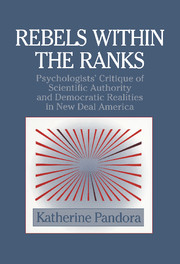 Rebels within the Ranks
Rebels within the Ranks Book contents
- Frontmatter
- Contents
- Acknowledgments
- Introduction
- 1 The Deep Context of Dissent: Jamesian Philosophy and Social Gospel Theology
- 2 Challenging the Rules of the Game
- 3 Defying the Law of Averages: Constructing a Science of Individuality
- 4 The Pursuit of “Impure” Science: Constructing a Science of Social Life
- 5 Natural History and Psychological Habitats
- 6 Exploratory Relativism and Patterns of Possibility
- Conclusions
- Notes
- Index
1 - The Deep Context of Dissent: Jamesian Philosophy and Social Gospel Theology
Published online by Cambridge University Press: 06 October 2009
- Frontmatter
- Contents
- Acknowledgments
- Introduction
- 1 The Deep Context of Dissent: Jamesian Philosophy and Social Gospel Theology
- 2 Challenging the Rules of the Game
- 3 Defying the Law of Averages: Constructing a Science of Individuality
- 4 The Pursuit of “Impure” Science: Constructing a Science of Social Life
- 5 Natural History and Psychological Habitats
- 6 Exploratory Relativism and Patterns of Possibility
- Conclusions
- Notes
- Index
Summary
In sum, James is a metaphysical democrat.
Horace Kallen (1925)Political democracy without economic democracy is an uncashed promissory note, a pot without a roast, a form without substance.
Walter Rauschenbusch (1912)As children of the Progressive Era who would later choose to work in the social sciences, Allport and the Murphys came of age in social and intellectual worlds that have been well scrutinized by scholars. Indeed, increasing historical attention has been directed at the fact that the attitudes characteristic of their parents' generation – reformist zeal, faith in scientific knowledge, and passion for organization building – powered the professionalization and institutionalization of the social sciences at the turn of the century. In many ways, the historiography of the social sciences in this period of disciplinary formation is a province of the larger realm of the historiography of Progressivism.
The most insightful set of interpretations that exist regarding the growth of the social sciences in the early twentieth century relate to the increasing appeal that scientism held for many practitioners. Dorothy Ross, for example, in The Origins of American Social Science, finds that “during the 1920s the cultural authority and social power of scientism pushed the center of gravity in the social science professions toward a harder and more technocratic conception of social science.” But as Ross herself has observed elsewhere, “The wave of scientism launched before and after World War I did not wholly prevail,” and, in fact, “scientism set in motion substantial countercurrents in defense of social science methods that took into account the uniquely human attributes of subjectivity and choice,” especially during the 1930s and 1960s, “when reformist attitudes arose in the society at large.”
- Type
- Chapter
- Information
- Rebels within the RanksPsychologists' Critique of Scientific Authority and Democratic Realities in New Deal America, pp. 17 - 34Publisher: Cambridge University PressPrint publication year: 1997


